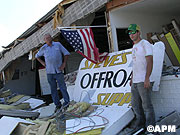| ||||||||||||||||||||||||
September 10, 2005
In the aftermath of Hurricane Katrina, many Minnesotans have wondered whether this state is prepared for a similar large-scale disaster. Many emergency managers say they think Minnesota can handle such a challenge, whether it be a flood, a tornado or a terrorist attack. But they say state and local officials should learn from what's happened in the gulf region to improve the state's preparedness.
St. Paul, Minn. — Minnesota will never have to cope with a category four hurricane, but there are still enough doomsday events that could trigger a mass evacuation here.
"If you had a terrorist incident, or a nuclear bomb or a biological weapon in a major metropolitan area, that could trigger that kind of need," said Gov. Tim Pawlenty on his weekly radio show.
Pawlenty said Minnesota is well prepared to deal with tornadoes, blizzards and other natural disasters. But he said state officials will study the emergency response to Hurricane Katrina to prepare for a disaster of that magnitude.
"One of the things we're going to do is go back and make sure we have thought through the scenarios that have this kind of ultra-catastrophe dynamic to it, where you have to evacuate a major population center in short order," Pawlenty said.
Local emergency responders say they're constantly planning for worst-case scenarios, but those plans are always a work in progress.
"We have a good plan, we have a good sense of what might happen," said Judson Freed, director of emergency management for Ramsey County. "Is there something we've missed? Is there something that we should be doing differently or better? The assumption is that, yes, there is something that I've missed, there is something that I could be doing better."
Freed said Ramsey County's plan includes a checklist of 69 items, such as who is responsible for evacuating sick people, and who is responsible for alerting people who don't speak English. The plan identifies places that could be used as shelters, such as the Xcel Energy Center, although their availability depends on where the disaster hits.
Freed thinks Minnesota has some advantages when it comes to emergency preparedness. He said public safety agencies at all levels have a track record of working together, which would help them coordinate their efforts in a crisis.
And many first responders in the metro area could communicate through a common frequency radio system. Hennepin County Sheriff Pat McGowan says communications is always the greatest challenge during a disaster.
"That's been the biggest failure that we noted during the 9/11 terrorist attacks and we've noticed down in Katrina as well," McGowan said.
Some members of McGowan's staff traveled to an area near New Orleans, to help with emergency communications after the hurricane. McGowan said the communications team brought 100 portable radios to allow first responders to talk to each other. He said the common frequency radio system would be essential in a disaster situation in Minnesota.
The Legislature this year approved funding to continue to expand the radio system, which currently includes the seven-county metro area and two other counties.
In addition to law enforcement agencies, the state would need coordinated medical services in the aftermath of a major disaster. Minnesota has received about $25 million from the federal government over the past few years for hospital preparedness.
Robert Einweck, director of emergency preparedness for the state Health Department, said planners have divided the state into eight regions, assigning one lead hospital to coordinate disaster response. But Einweck says even the most careful planning couldn't prepare for a disaster on the scale of Katrina.
"Emergency medical services, even if they had the trucks and the staff, they couldn't get gasoline to run their vehicles down there," said Einweck. "You do build a lot of your planning around certain assumptions, and for your single point of failure to be the lack of availability of gasoline, that's tremendously frustrating."
Einweck and other emergency planners say they will study the lessons learned from Hurricane Katrina, and review all of their plans to date. They say if Minnesota is better prepared for a major disaster, at least one good thing will have resulted from the tragedy on the Gulf Coast.




